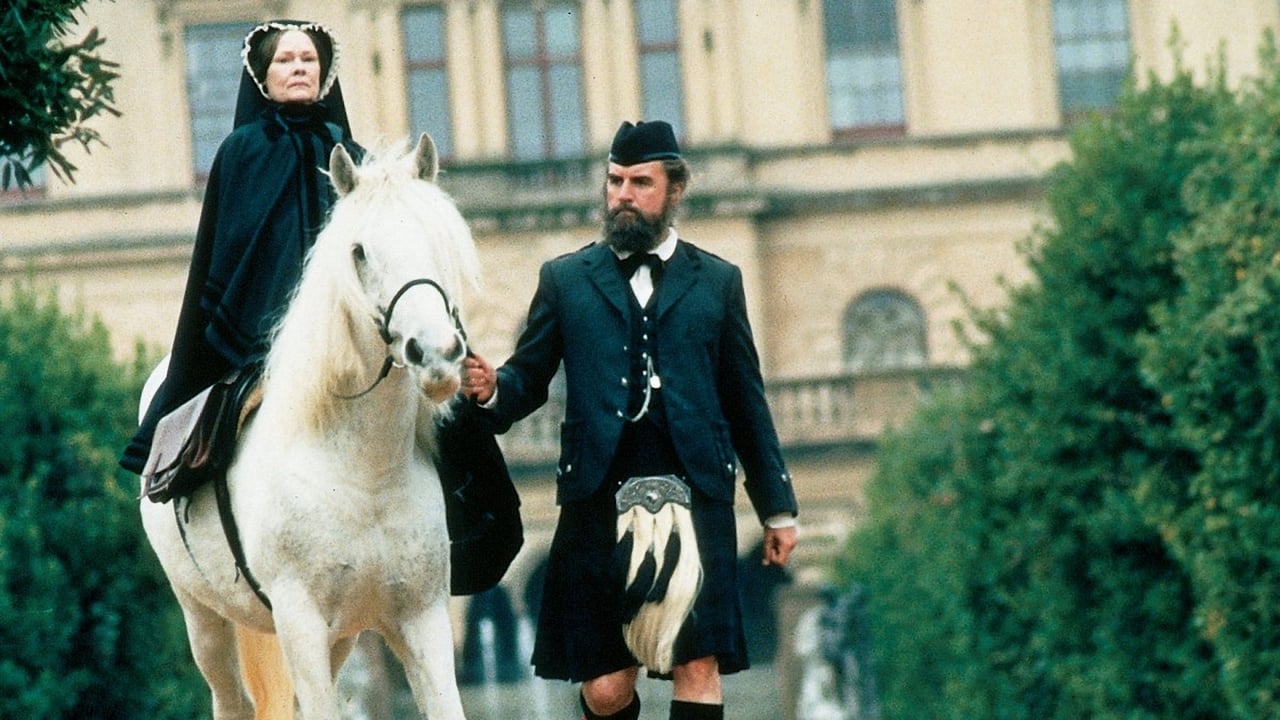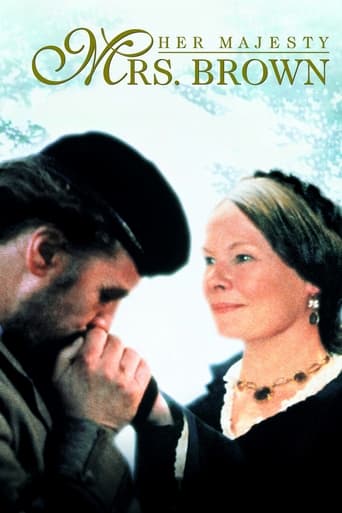



Fanciful, disturbing, and wildly original, it announces the arrival of a fresh, bold voice in American cinema.
View MoreThere is, somehow, an interesting story here, as well as some good acting. There are also some good scenes
View MoreVery good movie overall, highly recommended. Most of the negative reviews don't have any merit and are all pollitically based. Give this movie a chance at least, and it might give you a different perspective.
View MoreStrong acting helps the film overcome an uncertain premise and create characters that hold our attention absolutely.
View MoreJudi Dench and Billy Connolly are great in this movie. Judi Dench is always great! She deserved an Oscar for this. It was nominated, and it was one of the finest performances of all time.If you are expecting this film to be a romance than skip it. It's about the extraordinary man with the ordinary name of John Brown who brought a Queen out of mourning, and how their relationship leads to scandal in Britain.I found watching Young Victoria before Mrs. Brown to be useful and insightful into the eyes of Queen Victoria and her love for Albert. There is no character actually named Mrs. Brown in 'Mrs. Brown,' and was sad what happens to John at the end, but it was an awesome movie.
View MoreThe middle part of Queen Victoria's reign is one of the most interesting and unusual among monarchs of the modern age. "Mrs. Brown" (aka, "Her Majesty Mrs. Brown") covers that period. The queen and Prince Albert had been happily married for nearly 21 years when he died of suspected typhoid fever. As the movie opens, Victoria has been long in mourning over his death in 1861. Many months pass, and her family, the royal household, and the parliament want her to return to her public duties and get on with life. Finally, Victoria sends for a personal servant whom Albert had highly regarded at their Balmoral Castle in Scotland. For the next 20 years, John Brown takes charge of the queen's life and the royal household. The queen slowly comes to life again. The Prime Minister, Benjamin Disraeli, convinces Brown of the need for the queen to resume a public life for the sake of the kingdom. Brown helps the queen see the need and wisdom of doing so. Brown is much despised among the royal family, household and officials. Yet, he continued to enjoy a unique position and closeness to the queen until his death from pneumonia in1883.Much about the relationship of Queen Victoria and John Brown remains secret or mysterious. It is still controversial among historians today. But, most agree that Brown's role was helpful to the crown and England. Barely half a century later, another unusual royal relationship would rock Russia. The "mad monk," Rasputin, wielded uncanny and bizarre influence at times over the Romanovs, Nicholas and Alexandra. Rasputin was killed on Dec. 30, 1916, less than two months before the start of the Bolshevik Revolution. He has been viewed by some historians as having helped bring and end to the Russian monarchy.Judi Dench does justice to the character of Victoria, and Billy Connolly is excellent in the role of John Brown. Other roles are all handled very well by a superb cast. The history of the time comes alive in the scenery and settings for the film. But for some curious aspects of this film, I wouldn't have written these comments since there were already many reviews. The first oddity to me was with the lead actress, Judi Dench. Queen Victoria was a short, stout woman, and rather plain looking. If anything, Dench gives her more character in her face. But, she seems way too old at the start of the film – when she should be about 42. And then, she doesn't appear to age at all over the next 20 years. She even seems to be a little younger. This was enough of a distraction to me that I couldn't get into the film – in the time and place, for the maximum enjoyment. Victoria and Albert had nine children. Two died in their 30s and the other seven lived long lives – to an average of 76. At the start of the film, four of them would be teens and three of them younger. We don't see the two youngest at all – Beatrice and Leopold, and the others all appear as older children and young adults. Albert (Bertie) who would become King Edward VII, and Princess Alexandra of Denmark were married in 1863, when he was 21. Any of the film details about Brown and Victoria that may be true were probably taken from the Highland Journal, and its sequel, which Queen Victoria wrote and had published. Otherwise, there don't appear to be any other written or historical accounts. I suspect the notion of a diary kept by Brown was fictitious, since it was destroyed according to the movie. How would anyone know about it otherwise?
View MoreIf you are expecting this film to be a romance than skip it. It is about the extraordinary man with the ordinary name of John Brown who brought a Queen out of mourning. Not that a whole lot of gossip about Queen Victoria and her Scot's highland servant Brown wasn't bandied about in their day. That's the way it is in court politics, then and now.Judi Dench is the Queen who when this story begins was getting the unflattering nickname of the widow of Windsor. By the merest of chance in these royal arranged marriages it was arranged she should marry a cousin, Albert of Saxe-Coburg Gotha. She and Prince Albert had a good score of married years with several children. They were so happy that when Prince Albert died of typhoid fever in late 1861, Victoria went into a really lengthy mourning period beyond all normal parameters. The woman would have needed grief counseling had it been available back in her day. She shut herself up in Balmoral Castle in Scotland and made no public appearances. Nor would she allow any of her children to substitute for her, particularly the Prince of Wales. With that kind of mentality operating, a whole lot of people questioned the need even for a monarchy.Into her life comes John Brown, brother one of the household help already at Balmoral and hired to tend the Queen's horses. Billy Connolly plays the rough spoken Brown who somehow even through his tough highland talk, endears himself to his Queen with his common sense and total concern for her well being. Gaining the position he does in the Victorian household, Brown makes many enemies who try to bring him down. The period of the film covers when he arrives in the Queen service in 1866 until his death in 1883. Connolly makes a fine Brown though if the film had been made 25 years earlier, the part was made for Sean Connery.Her Majesty, Mrs. Brown gained to Oscar nominations for Judi Dench for Best Actress and for Best Makeup. Shooting on location in the royal palaces and grounds which are nicely preserved from Victoria's time, the film does have the look and feel of Victorian Great Britain and the troubled monarch who reigned over the Empire.Were she and Brown ever physical? I doubt that very much, the very practical Brown was not a stupid man and would never have pushed his luck that much. But he was a tower of strength for the woman whom he brought out of mourning to take her place which was a large one in the world.
View MoreThe nature of Queen Victoria's relationship with her Scottish servant John Brown certainly isn't of earth-shaking historical significance, however it does make for an interesting enough story, some good speculation (both in their day and in ours) and a reminder that royal scandal didn't begin with the current crop of British royalty.After the death of her beloved husband Prince Albert, Victoria became very attached to Brown, who in turn became very protective of her. Their relationship was for the most part a very informal one (shockingly so to others, to whom deference to royalty - especially from commoners, and servants to boot! - was the natural state of affairs) and the obvious closeness of their relationship led to rumours and innuendo about the possibility of a love affair between the two. The movie takes no side on whether that happened or not (although the very closing scene, in which two of Victoria's most important counsellors are relieved that Brown's diary was found and that no one else had seen it perhaps implies that "something" had happened) and the reality is that there's no solid historical evidence to suggest that any romance developed between the two. The movie does portray in a very convincing manner the complications of such a friendship: the jealousy felt toward Brown by both his fellow servants (to whom he becomes quite haughty at times, rubbing their noses in his special status) and by other members of the royal family, who feared the potential for scandal and also resented the fact that Brown was closer to Victoria in many ways than they were.The movie is a good period piece. The sets and atmosphere seem authentic and there's some great Scottish scenery in the midst of the story. The movie also features great performances from Judi Dench as Victoria and Billy Connolly as Brown. Also not to be overlooked is a fine performance from Antony Sher as Disraeli - the Prime Minister whose own position as head of government is being threatened by the Queen's increasing unpopularity when she secludes herself for years after Albert's death, and who eventually has to seek Brown's help (because Brown seems to be the only one with influence over her) to get Victoria to reclaim her public role as sovereign. The story may be trivial from a historical perspective, but at least it's interesting trivia!
View More